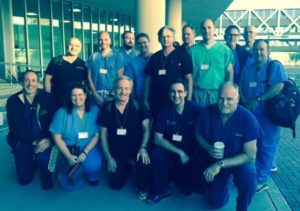I’ve been a member, including past president and board member, of the Association of Extremity Nerve Surgeons for a long time. I routinely attend meetings and lectures and train nerve surgeons, and I recently attended their annual meeting. These meetings are important to me, but they are also important to some of you and p eople that you know, because some of the research we do provides us with new information that helps people with diabetic foot problems, including the risk of amputation.
eople that you know, because some of the research we do provides us with new information that helps people with diabetic foot problems, including the risk of amputation.
Many diabetics suffer from neuropathy. They struggle with the typical diabetic symptoms as well as the burning, tingling, numbness and pain also associated with this disease, which leads to an increased risk of amputation.
What if you or someone that you know with diabetic neuropathy could reduce or eliminate the symptoms? What if something could be done to restore more normal nerve function? The risk of amputation in diabetics would be greatly reduced.
At the meeting I attended an important thing happened: two new studies regarding diabetics and neuropathy were discussed. One of the two studies was one that I have recently completed, and the other study was completed by Dr. Zhang from Shanghai, China.
Dr. Zhang’s study showed an improvement in lower extremity nerve function for patients he had performed surgical decompression surgery on (opening of the nerve tunnels), which is similar to carpal tunnel surgery done in the hand. His EMG studies showed improvement of the patients nerve function that lasted months and even years after having the procedure performed.
My study showed intraoperative improvement via EMG in nerve function within minutes of opening these nerve tunnels. This explains why many patients have immediate dramatic improvements in their symptoms, and can even feel their feet again.
The data from both studies demonstrates how quickly nerves can repair and that the effects are long term. These study results are supported clinically by other surgeons who also perform these procedures, and it supports what our patients are saying as well.
It is our desire to change the narrative, to change the thought of conventional medicine. Between our two studies we have a good scientific foundation that proves how much diabetic patients can be helped.
So next time you’re thinking about treatments for diabetic neuropathy for yourself or someone you know, ask yourself this question: are drugs, with their unwanted and often dangerous side effects, the best answer?
We continue to do surgical decompression surgery for patients suffering from diabetic and non-diabetic neuropathy. We have a large volume of scientific data that shows improvement in various nerves after surgery. So next time you or anyone you know says there’s nothing that can be done, or you hear the Lyrica ads on TV or are considering using Neurontin to help with your neuropathy pain, remember these studies. The real hope of relief from neuropathy pain and numbness is now clinically supported and available to help those in need. We are truly on the forefront of a treatment shift in dealing with this debilitating disease.
Our study will be published shortly and I will be sure to highlight the results with you. I enjoyed meeting and sharing our research with a surgeon so far away who is also trying to help to change how medicine treats such a dreaded problem. We hope to collaborate and present our findings more in the future, both here and in China and other parts of the world.



